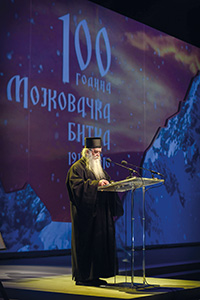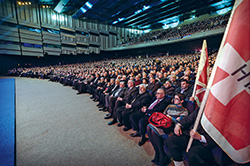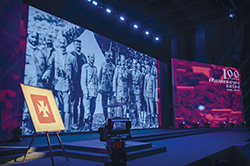Century
METROPOLITAN AMFILOHIJE: A SERMON MARKING THE HUNDREDTH ANNIVERSARY OF THE BATTLE OF MOJKOVAC (1916–2016)
For the Salvation of Montenegro and Entire Serbiandom
This is how famous sirdar Janko Vukotić called his warriors to battle, on Christmas Eve of 1916, in Mojkovac, saving the face of both his homeland and his king gone astray. ”If you manage to keep off the enemy for 24 hours, you will pay your debt to Serbiandom”, wrote regent Aleksandar Karađorđević to the sirdar a day earlier. And so it was, they sacrificed themselves to help their brothers and became an eternally shining immortal example. Today, at the time of a terrible disorder between Montenegro and Serbia, it is a spark we can all be warmed by
 When, after Holy Petar II of Lovćen the Oracle passed away (1851) and Prince Danilo Petrović chose the path of a secular ruler, archimandrite Nićifor Dučić said: ”Here’s a new misfortune for the Serbian people.” Prince Danilo, accepting the role of only secular ruler, took a path different from the one down which his Petrović predecessors walked and led Montenegro, the supporters and carriers of the idea of renewing the ”Slavic-Serbian empire”, from Metropolitan Danilo ”duke of Serbian land” to Petar II. The direction is clearly stated in the message of Petar II sent to prince Aleksandar I Karađorđević through Matija Ban (1848): ”He goes to Prizren as a king, I go to Peć as a patriarch.” And added: ”Tell him to give up Europe, which is holding a dead Turkish hand under our throat.”
When, after Holy Petar II of Lovćen the Oracle passed away (1851) and Prince Danilo Petrović chose the path of a secular ruler, archimandrite Nićifor Dučić said: ”Here’s a new misfortune for the Serbian people.” Prince Danilo, accepting the role of only secular ruler, took a path different from the one down which his Petrović predecessors walked and led Montenegro, the supporters and carriers of the idea of renewing the ”Slavic-Serbian empire”, from Metropolitan Danilo ”duke of Serbian land” to Petar II. The direction is clearly stated in the message of Petar II sent to prince Aleksandar I Karađorđević through Matija Ban (1848): ”He goes to Prizren as a king, I go to Peć as a patriarch.” And added: ”Tell him to give up Europe, which is holding a dead Turkish hand under our throat.”
The supporter of the same idea was undoubtedly Danilo’s successor, great prince and king of Montenegro, Nikola I Petrović. His anthem: ”There, there, behind those hills… to see Prizren, that is mine, I’m going home”; his liberation of the Vasojevići as ”pivot of the Raška land” (as he also sang) and, together with his brother-in-law, king Petar I Karađorđević, liberation of Kosovo and Metohija (1912); his invitation to Montenegrins (1914), after Austro-Hungary had declared war to Serbia, to follow ”their two old Serbian kings” in defending the freedom and face of the Serbian nation – all that and many other things, show that he continued walking the road of his holy lineage.
 However, through him began the fulfillment of the bitter prophecy of Nićifor Dučić. At the beginning, the most important thing for him was liberation and unification, in the spirit of Dušan’s Empire, of enslaved brothers (his message to Prince Mihailo Obrenović – it is important to unite Serbiandom, even if he had to hold the Serbian prince’s stirrup). However, after his coronation with the crown of Holy Stefan of Dečani (1910), and suggesting his Metropolitan Gavrilo Dožić, later Serbian patriarch, for the first Metropolitan of Peć (after the suspension of the Patriarchate of Peć in 1766), it is obvious that he still hoped he would be the unifier of Serbian lands and restorer of the Patriarchate of Peć. But, historical events took a different turn. It became clear to him already since the First and Second Balkan War, especially during World War I. So, near the end of his life, in order to save his dynasty, he found himself in a position to sacrifice many things he fought for his entire life, as well as his royal face. Secretly negotiating, through his sons, with Austro-Hungary behind the back of his allies, Serbia and Russia, following his personal and dynastic interests, probably believing that Serbia is doomed, probably receiving promises about expanding the borders of Montenegro, after the fall (better to say strange handover of Lovćen), king Nikola signed capitulation, ordered the dissolution of the Montenegrin army, and set off alone across the sea, down a road different than the one taken, over the Albanian Golgotha, by his brother-in-law Petar I and grandson, crown prince Aleksandar.
However, through him began the fulfillment of the bitter prophecy of Nićifor Dučić. At the beginning, the most important thing for him was liberation and unification, in the spirit of Dušan’s Empire, of enslaved brothers (his message to Prince Mihailo Obrenović – it is important to unite Serbiandom, even if he had to hold the Serbian prince’s stirrup). However, after his coronation with the crown of Holy Stefan of Dečani (1910), and suggesting his Metropolitan Gavrilo Dožić, later Serbian patriarch, for the first Metropolitan of Peć (after the suspension of the Patriarchate of Peć in 1766), it is obvious that he still hoped he would be the unifier of Serbian lands and restorer of the Patriarchate of Peć. But, historical events took a different turn. It became clear to him already since the First and Second Balkan War, especially during World War I. So, near the end of his life, in order to save his dynasty, he found himself in a position to sacrifice many things he fought for his entire life, as well as his royal face. Secretly negotiating, through his sons, with Austro-Hungary behind the back of his allies, Serbia and Russia, following his personal and dynastic interests, probably believing that Serbia is doomed, probably receiving promises about expanding the borders of Montenegro, after the fall (better to say strange handover of Lovćen), king Nikola signed capitulation, ordered the dissolution of the Montenegrin army, and set off alone across the sea, down a road different than the one taken, over the Albanian Golgotha, by his brother-in-law Petar I and grandson, crown prince Aleksandar.
A SAD ENDING OF THE ”EMPEROR OF HEROES”
It happened for the first time in his sixty-year reign: as if king Nikola, rightfully called ”emperor of heroes”, renounced with such an act the prince and king from Vučji Do, Grahovac, from the time of the Montenegrin-Ottoman war and the Herzegovian uprising, the Balkan wars, beginning of World War I… However, his face and the face of Montenegro of that time was saved in Mojkovac, on Christmas day of 1915, by sirdar Janko Vukotić, chief of staff of the Montenegrin army Supreme Command, commander of the Herzegovian unit and Sandžak army, together with Mitar and Milo Martinović and other commanders. Following the telegram sent by the Serbian army commander, regent Aleksandar: ”If you manage to keep off the enemy for 24 hours, you will pay your debt to Serbiandom”, sirdar Janko, during the burning of the  Christmas oak branch, promised that, with the help of Almighty God, ”our brave muscles will save Montenegro and the entire Serbiandom”. The later words of the same regent testify that it did happen: ”The example of immortal heroes, who sacrificed themselves in the Battle of Mojkovac in 1915, for the glory of Montenegro and the honor of our army, will glow eternally.” Thus the later famous saying: ”If it weren’t for Christmas in Mojkovac, there wouldn’t have been Easter in Kajmakčalan.”
Christmas oak branch, promised that, with the help of Almighty God, ”our brave muscles will save Montenegro and the entire Serbiandom”. The later words of the same regent testify that it did happen: ”The example of immortal heroes, who sacrificed themselves in the Battle of Mojkovac in 1915, for the glory of Montenegro and the honor of our army, will glow eternally.” Thus the later famous saying: ”If it weren’t for Christmas in Mojkovac, there wouldn’t have been Easter in Kajmakčalan.”
And not only that: these two orientations – the power craving and dynastic of king Nikola in the last years of his life, and the Mojkovac-Lazar like of Janko Vukotić and other knights of Mojkovac – leave a deep trace on the entire life of Montenegro (as well as Serbia), lasting to the present day. After the end of World War I, a great majority of Montenegrins (the separatist capitulation of king Nikola and his fleeing had a big contribution), at the Great Podgorica Assembly (1918) voted in favor of unification with Serbia, that is, Yugoslavia, while the Holy Synod of the Orthodox Church in the Kingdom of Montenegro (the first of all metropolitanates of the previous Patriarchate of Peć) voted for establishing the unity of the Patriarchate of Peć – on November 16, 1918. A relatively small group of supporters of king Nikola, encouraged by the Italian army, raised the fratricidal Christmas Uprising (1918), exclusively for dynastic reasons.
MOJKOVAC, STRONG SERBIAN FORTRESS
The so-called green-white division in Montenegro, encouraged by the Communist Party and revolution, later grew into fratricide between partisans and chetniks (Serbia experienced the same suffering), and later, after World War II, received in Montenegro a form of national divisions, spreading in time on all areas of social life – the separation of Serbia and Montenegro, the melting away of the language, culture, even the attempt of schism within the Church. The newly-born Montenegro, conceived and born in Broz’s Jajce, stopped being King Nikola’s Montenegro after its betrayal of Kosovo and Metohija, Orthodox Christianity, by abolishing the Cyrillic alphabet, began with the Austro-Hungarian and Nazi-fascistic occupation.
 Renouncing itself, it is now in search of a Duklja-Montenegrin identity, built upon an invented Duklja mythology and tribal-atheistic European market economy and its integrations. Everything is for sale: God, soul, face, father, mother. Unfortunately, Serbia is also forgetting the Karađorđević-Lazar orientation, its unique feature until after World War I, and, after passing through the bolshevist-Titoistic wasteland, is today also flirting with the almighty fetishized deity of the earthly empire, called market economy of the ”new order” of post-Christian Europe. (Just remember the Serbian minister of education, who has recently declared war against God, faith, religious education, replacing it with his fetish made of ignorance.)
Renouncing itself, it is now in search of a Duklja-Montenegrin identity, built upon an invented Duklja mythology and tribal-atheistic European market economy and its integrations. Everything is for sale: God, soul, face, father, mother. Unfortunately, Serbia is also forgetting the Karađorđević-Lazar orientation, its unique feature until after World War I, and, after passing through the bolshevist-Titoistic wasteland, is today also flirting with the almighty fetishized deity of the earthly empire, called market economy of the ”new order” of post-Christian Europe. (Just remember the Serbian minister of education, who has recently declared war against God, faith, religious education, replacing it with his fetish made of ignorance.)
In renouncing their commitment to the Heavenly Kingdom, Serbia and Montenegro, already in 1946, gave birth to autonomous province of Kosmet, today grown into so-called ”independent Kosova”, gaining more independent features and forms every day in Brussels, with the previous recognition of its independence by the Montenegrin authorities and with the approval of the present Serbian authorities.
Those, however, who continued their Austro-Hungarian-German (from World Wars I and II) Nazi-fascistic internal and external occupation with their NATO bombing of Serbia and Montenegro, plucking out Kosovo and Metohija from the bosom of Serbia, are they not holding a ”dead” yet iron hand of such anti-Christian Europe, not only under our throat, but under the throat of the entire world?! ”Drink sweet sherbet from the Prophet's cup or expect his axe blow between your ears!”
Be as it may, Mojkovac was and will always be a strong fortress. The poet says, speaking through Janko Vukotić: ”Oh, Lovćen, Dušan’s pride / You have been unconquered by now / until this bugbear of the world came / wrapped in thick darkness / but Brskovo, Lovćen will be ours (and Kosovo) / the eastern (Mojkovac-Kosovo vow) detachment will be glorified.”
(”Sava Centar”, Belgrade, January 18, 2016. Equipped by: NR Press)
